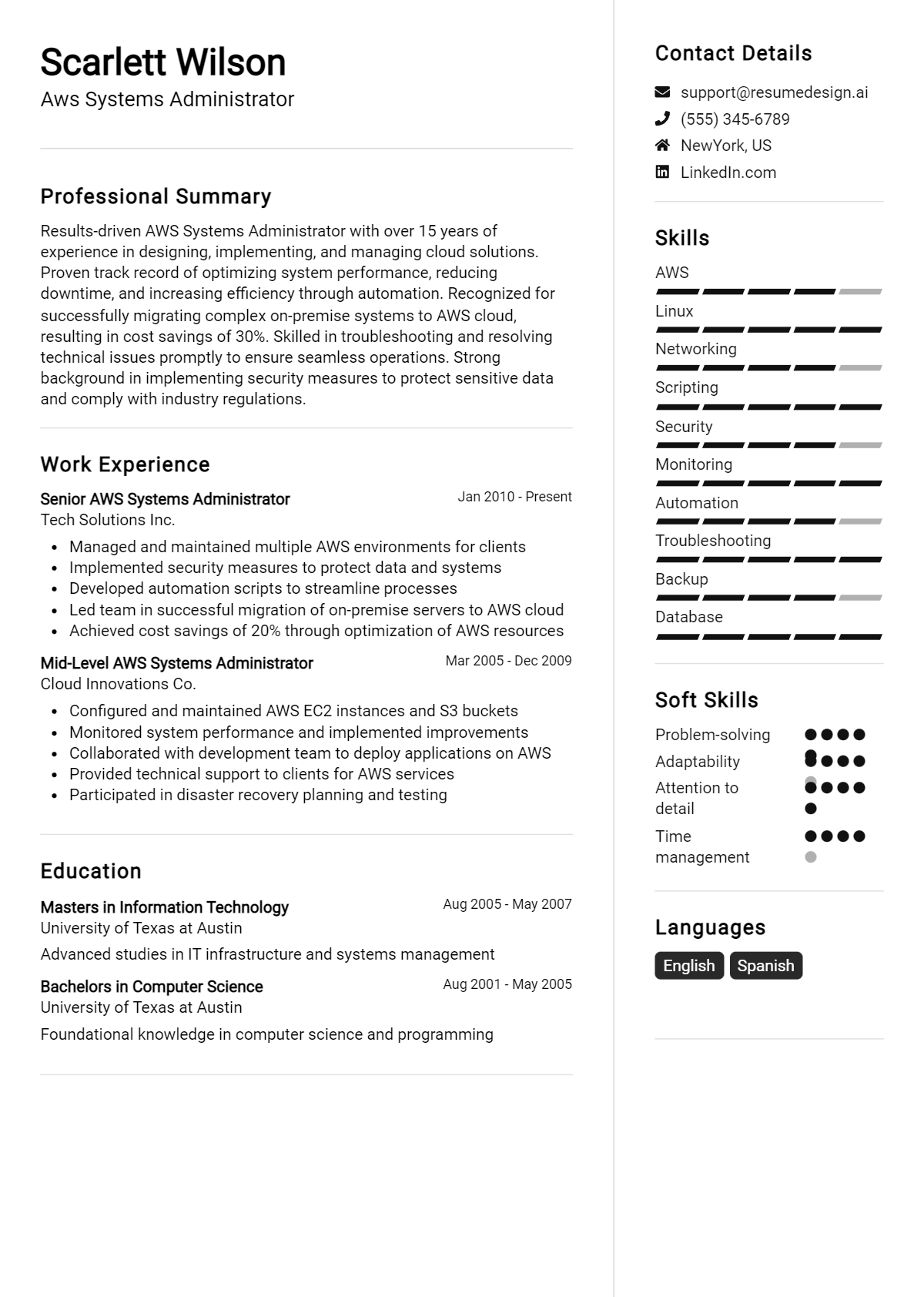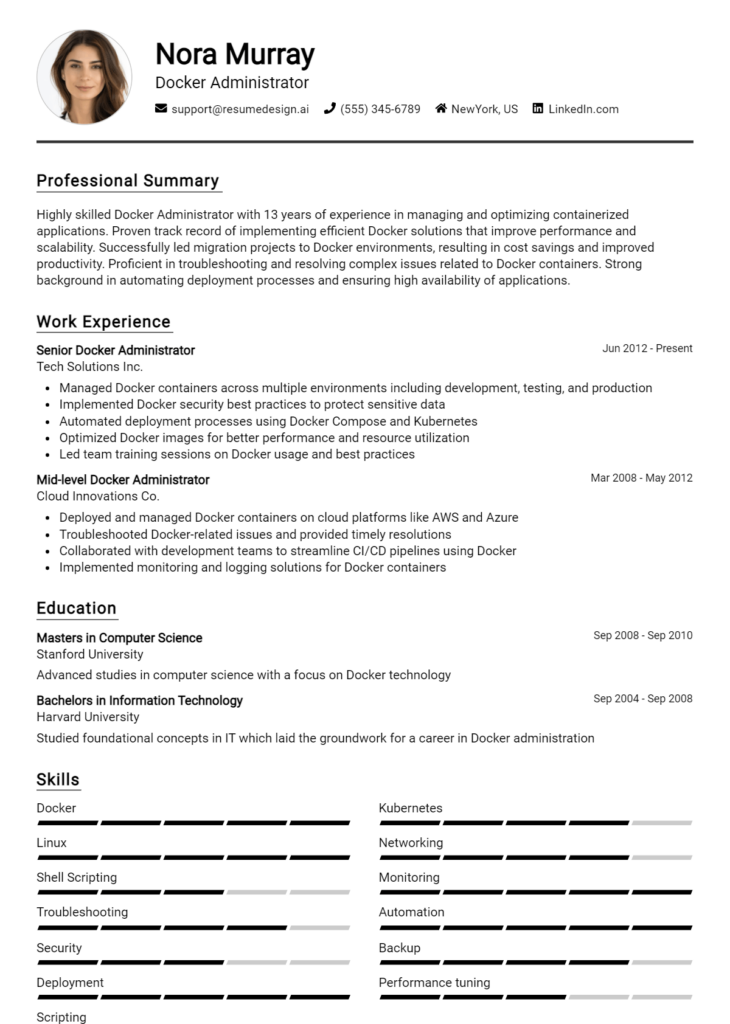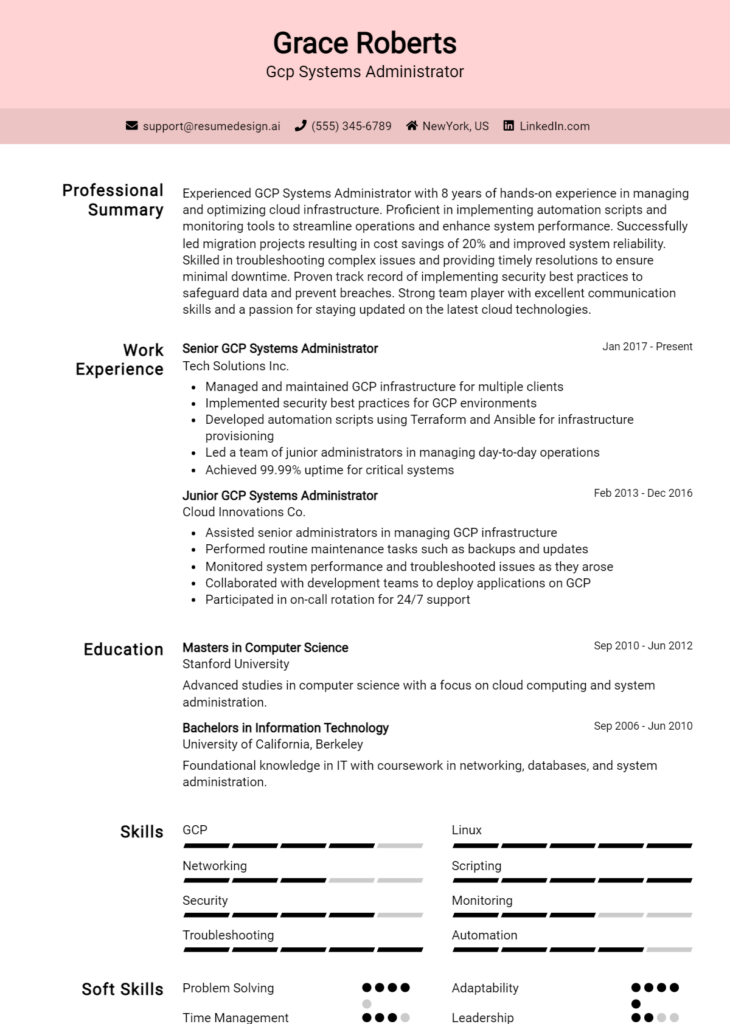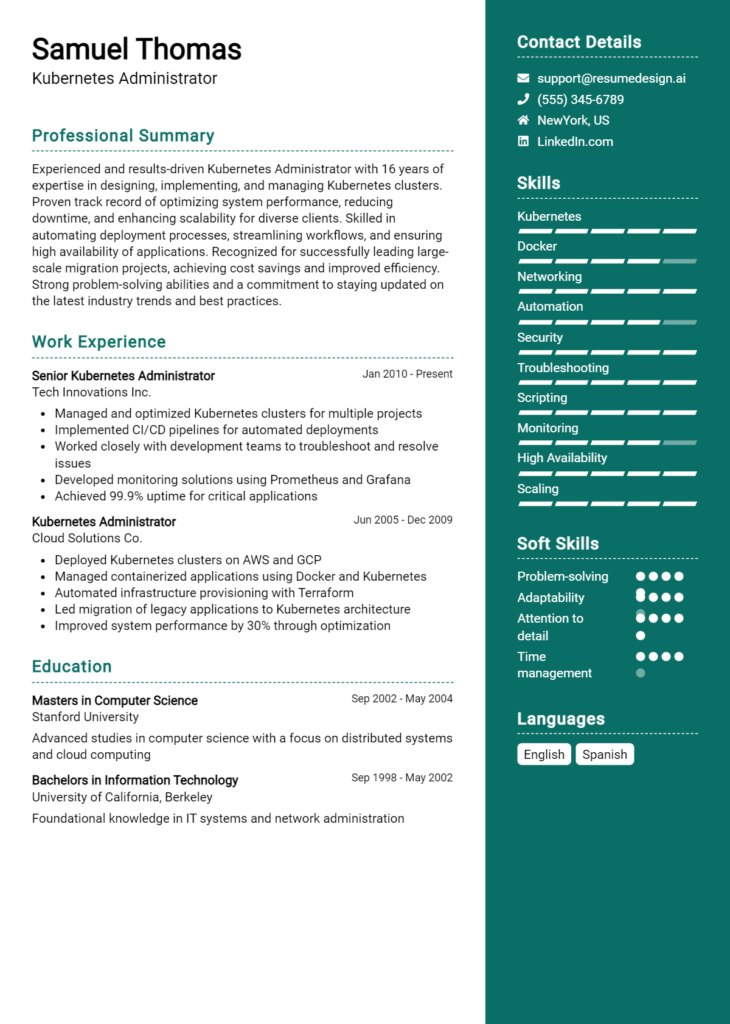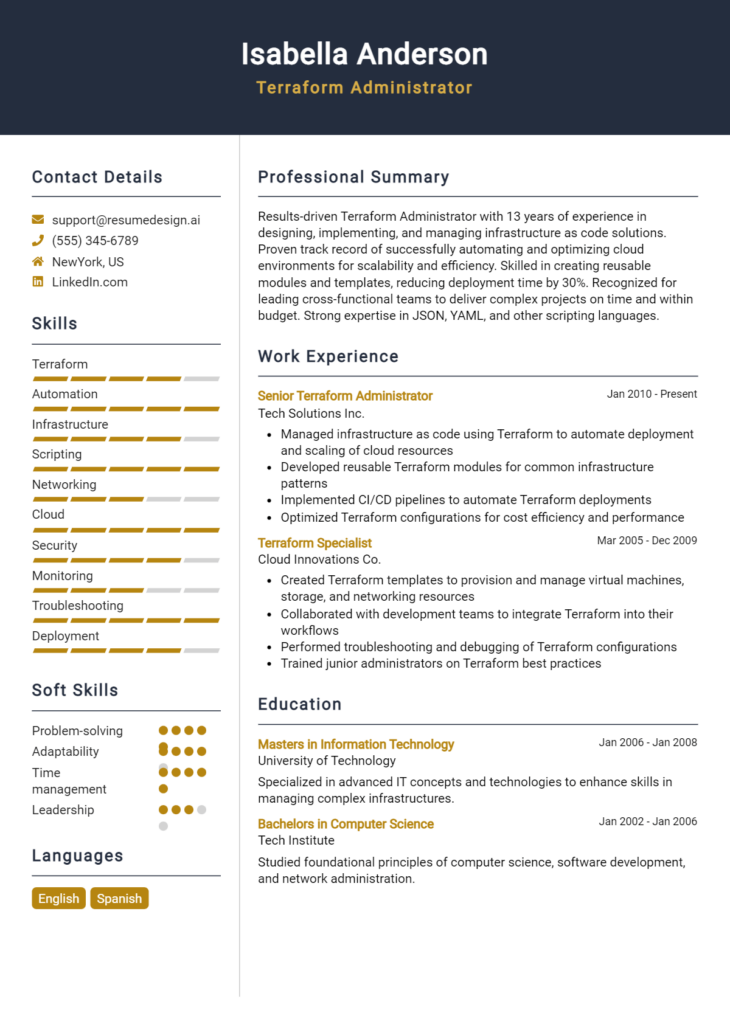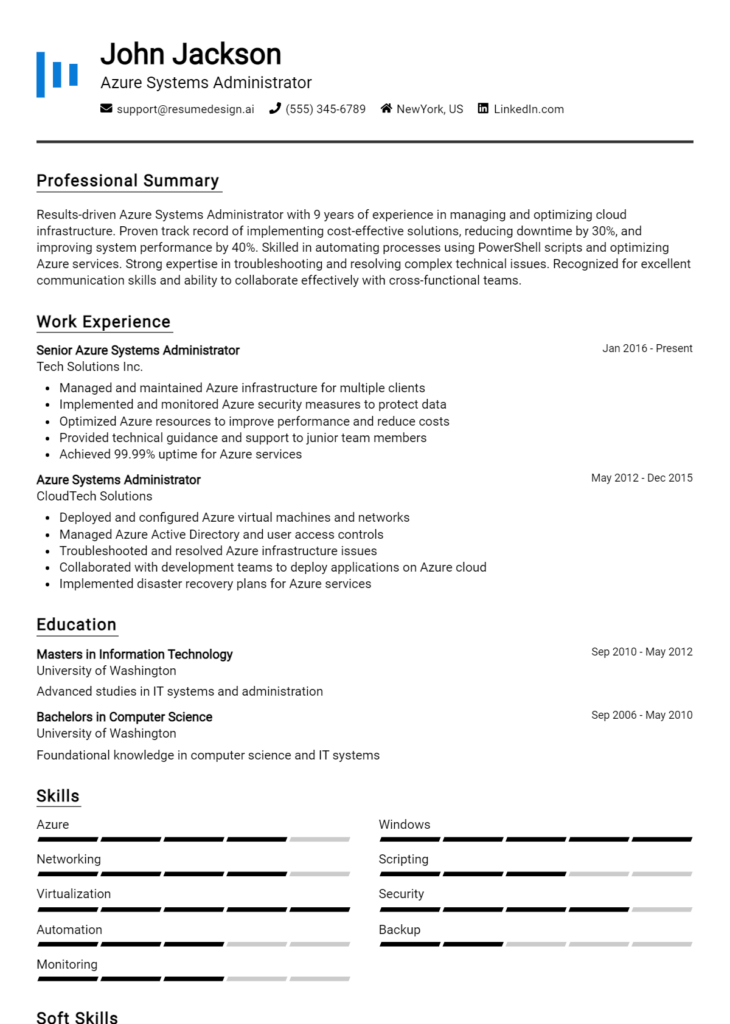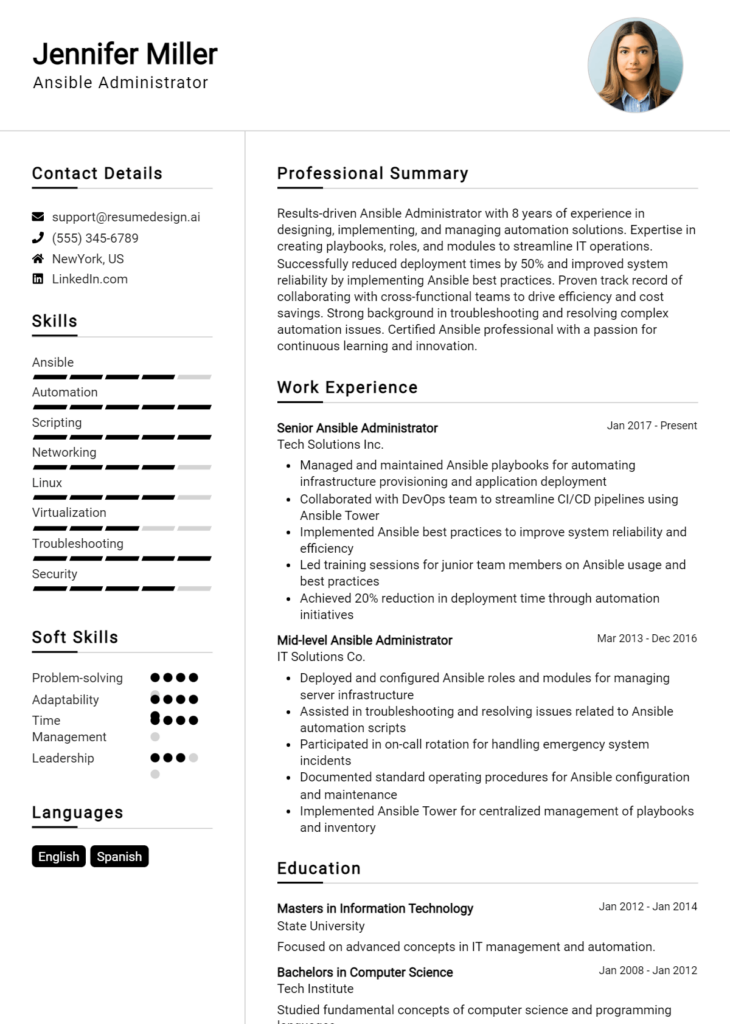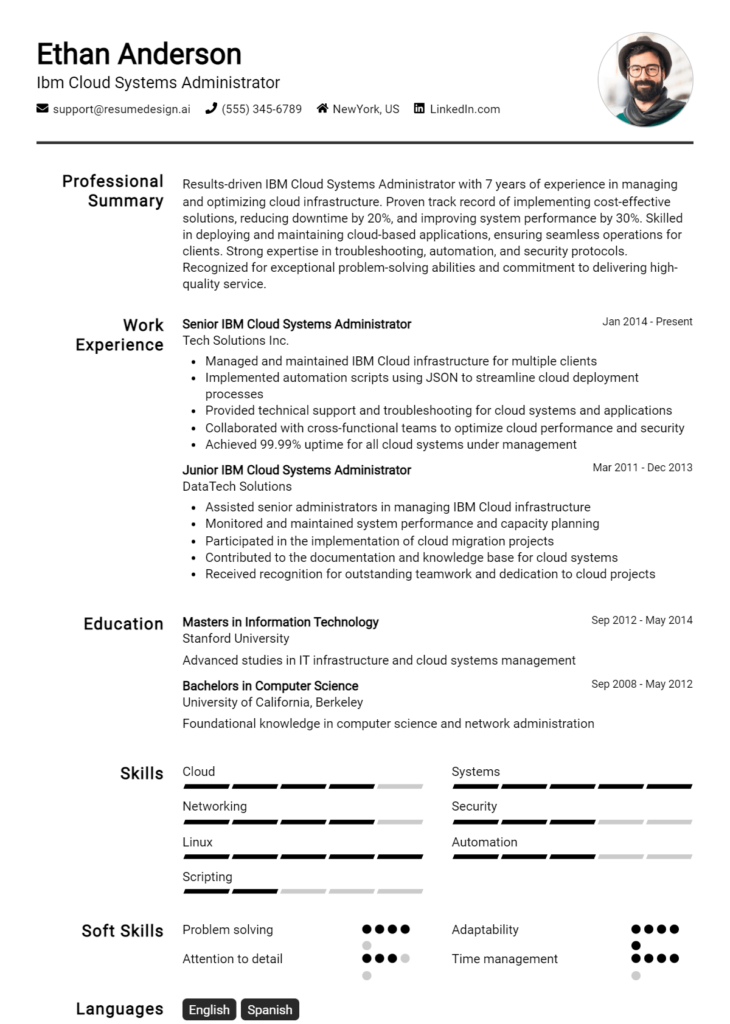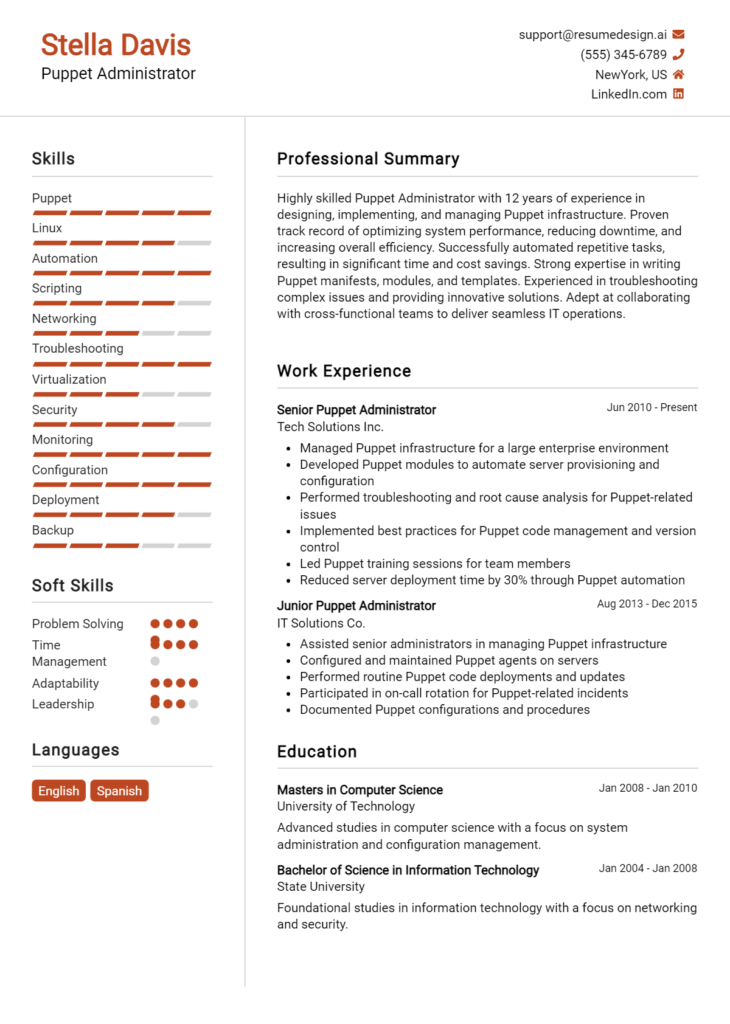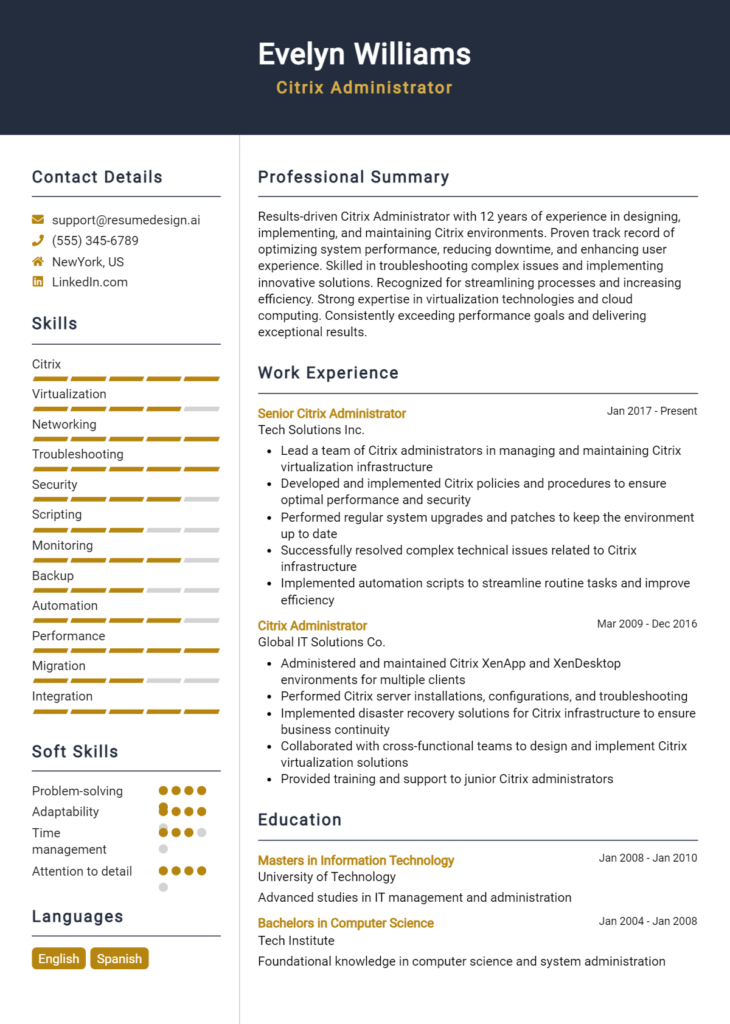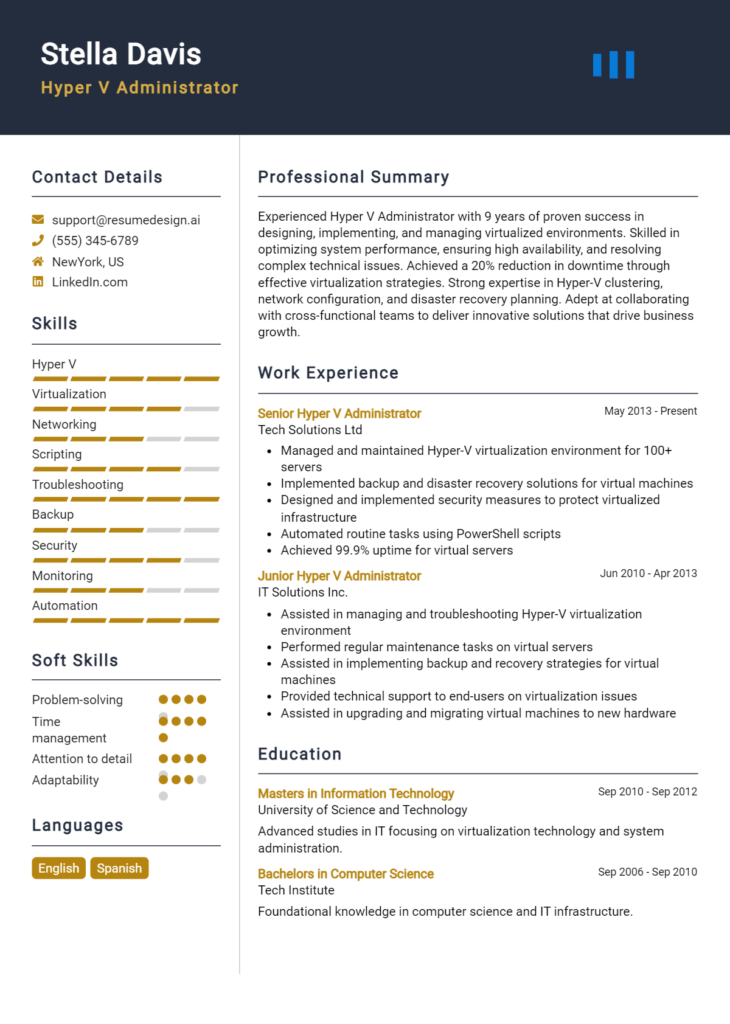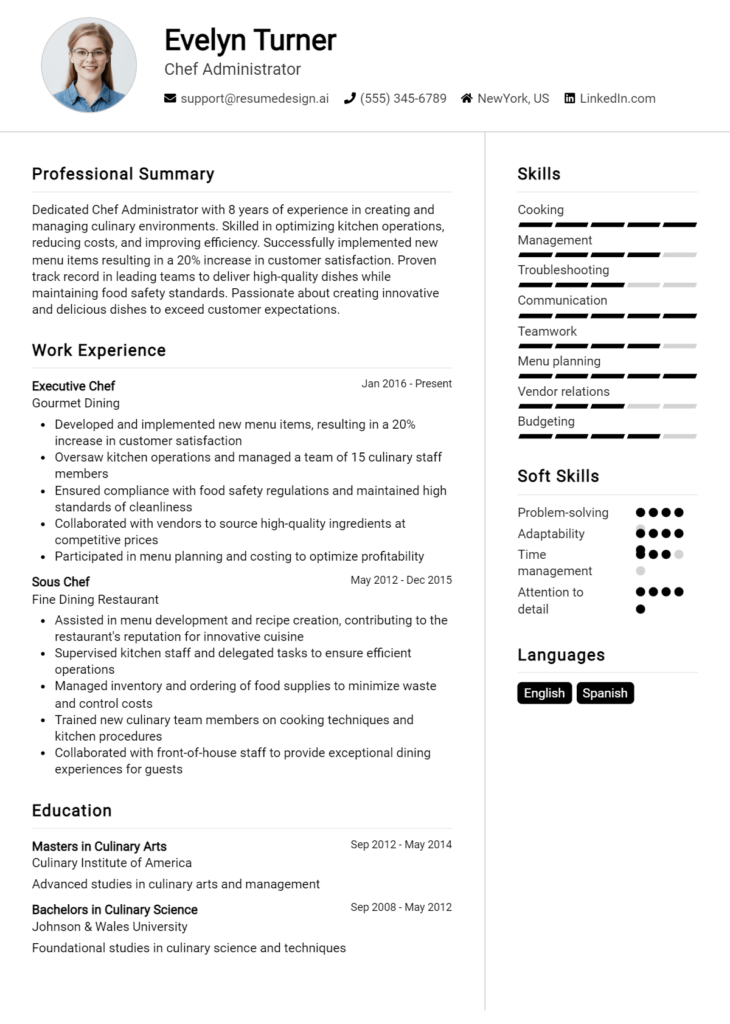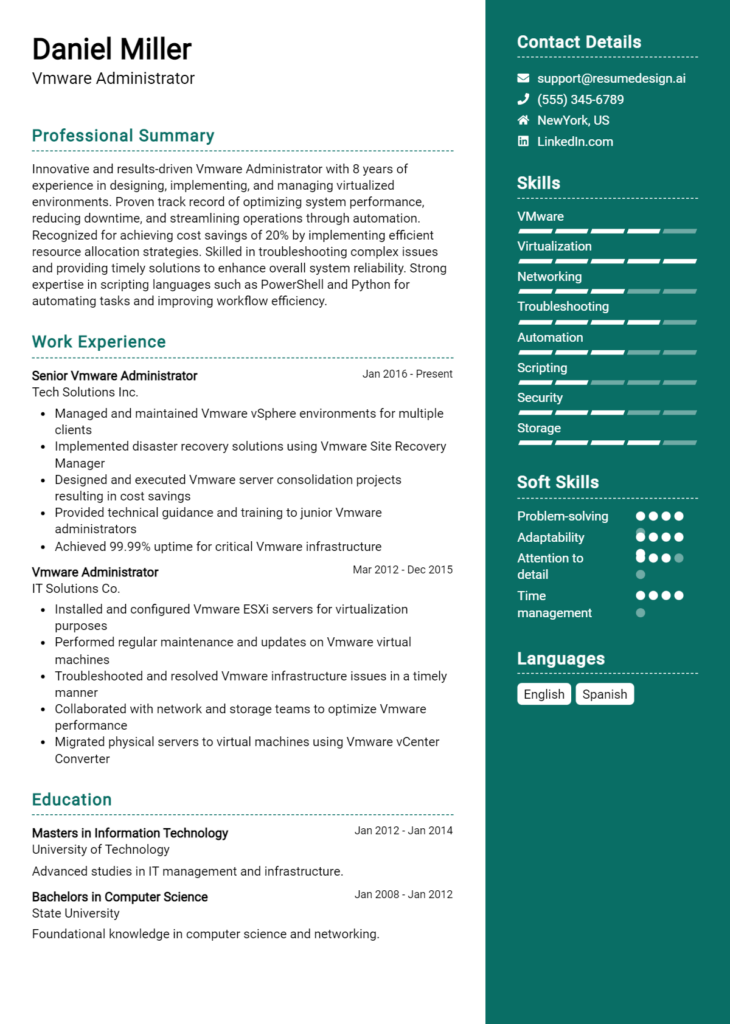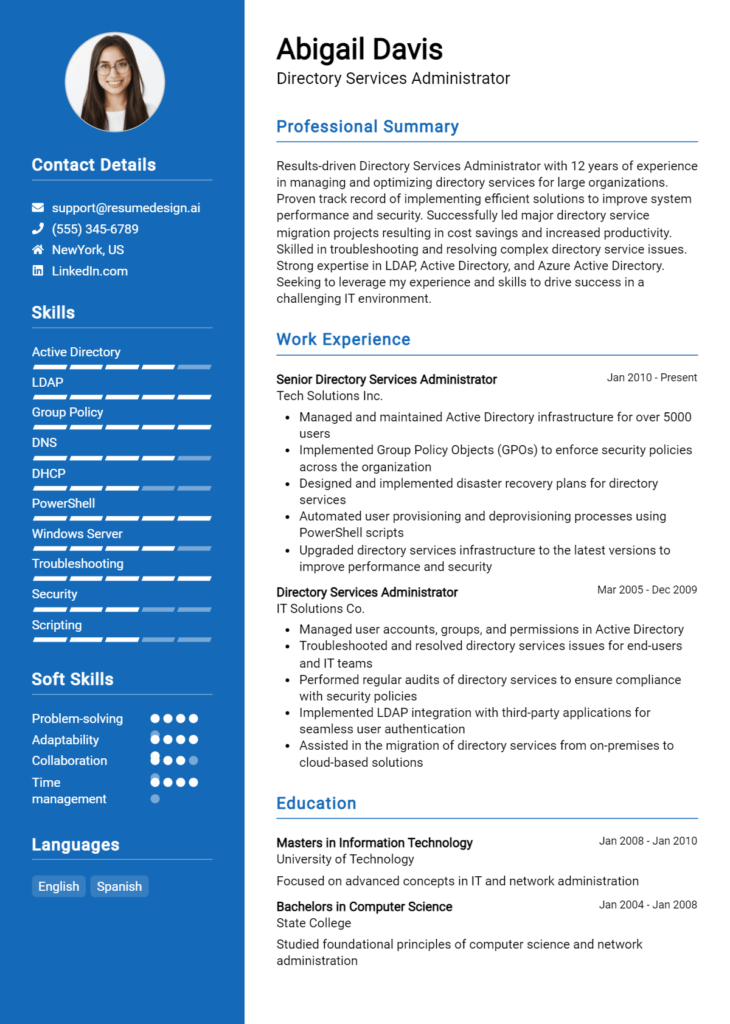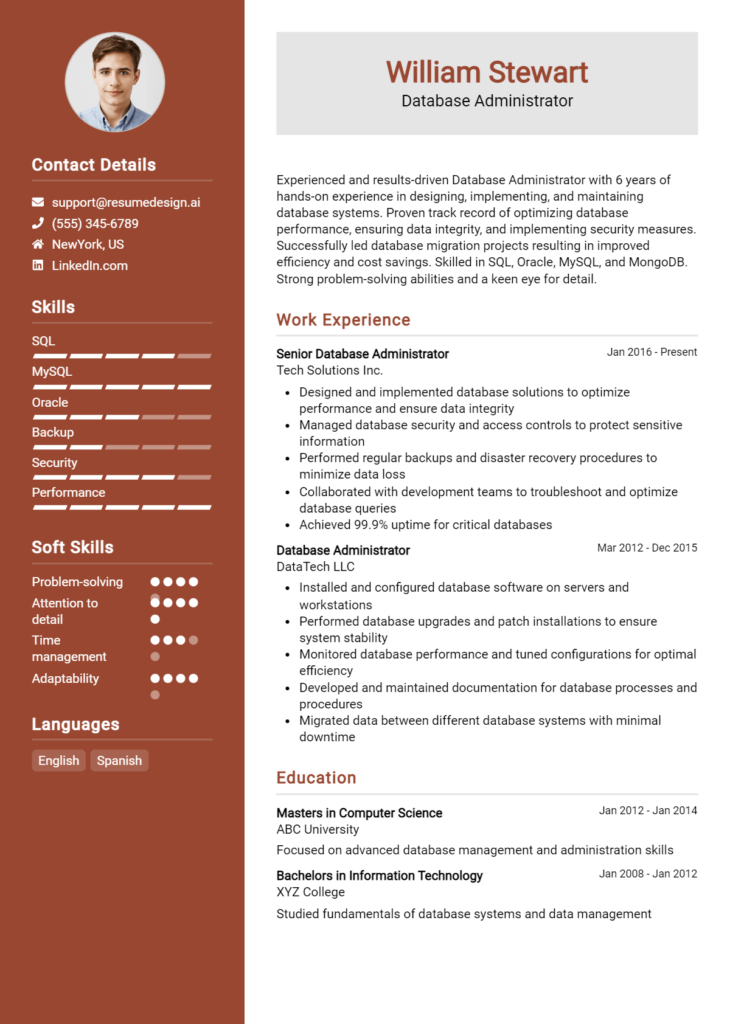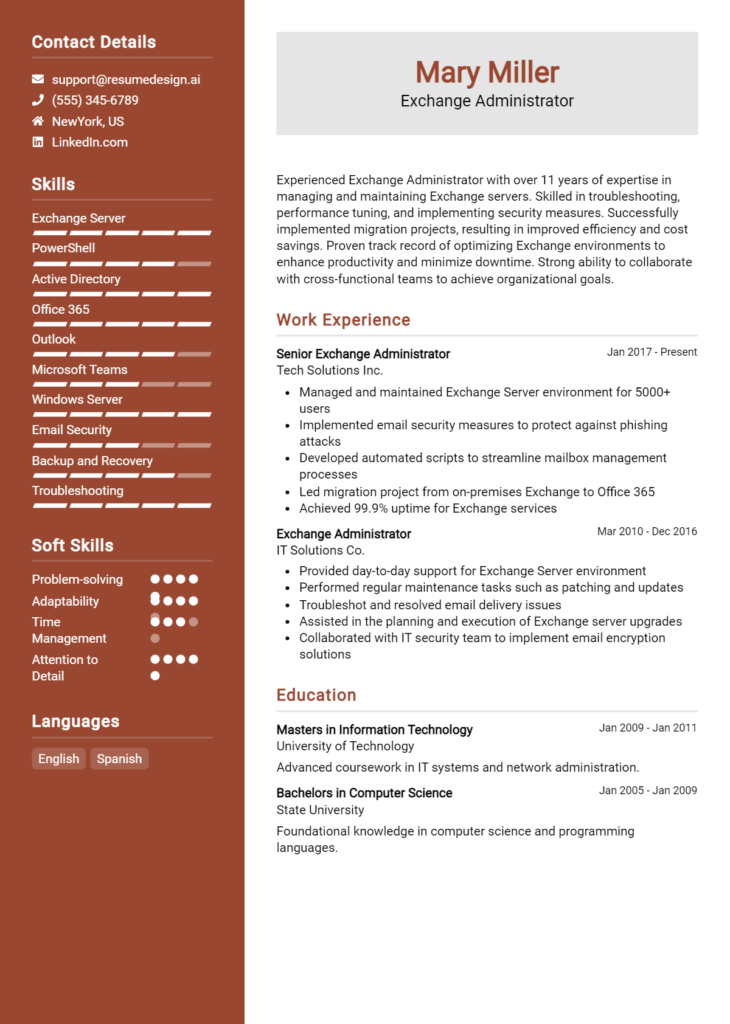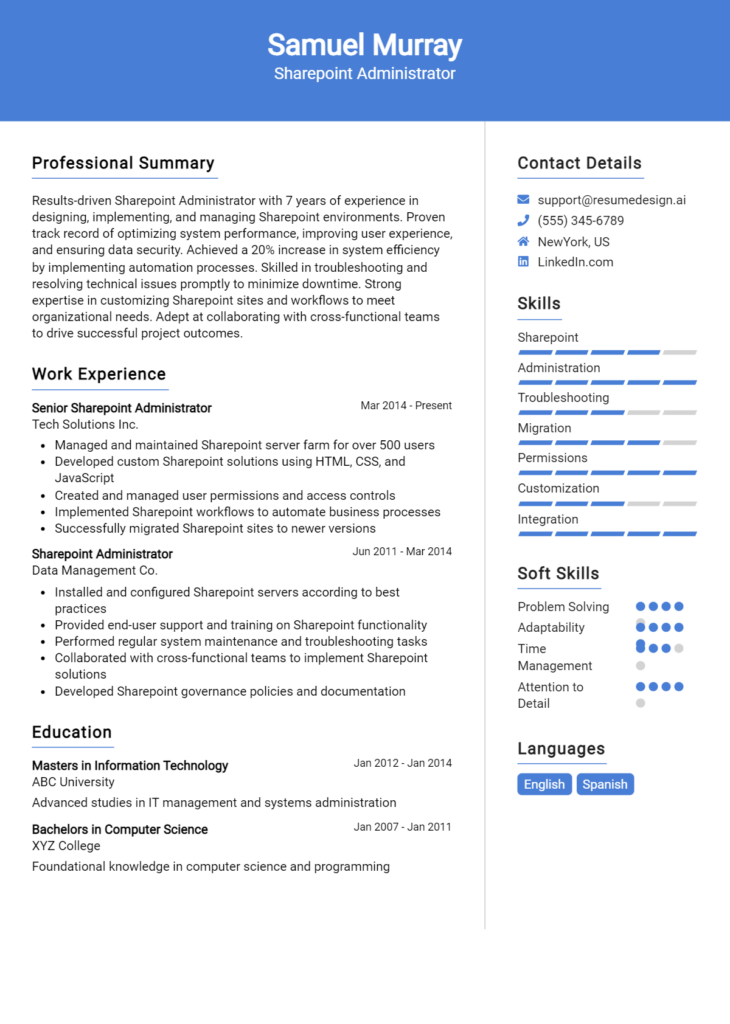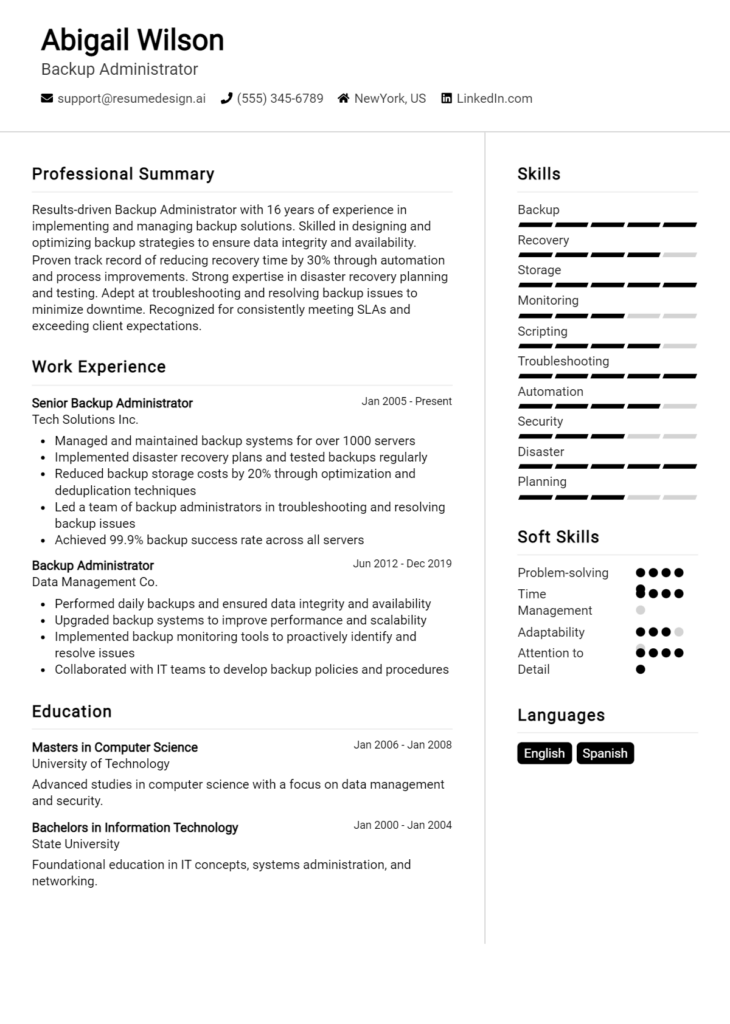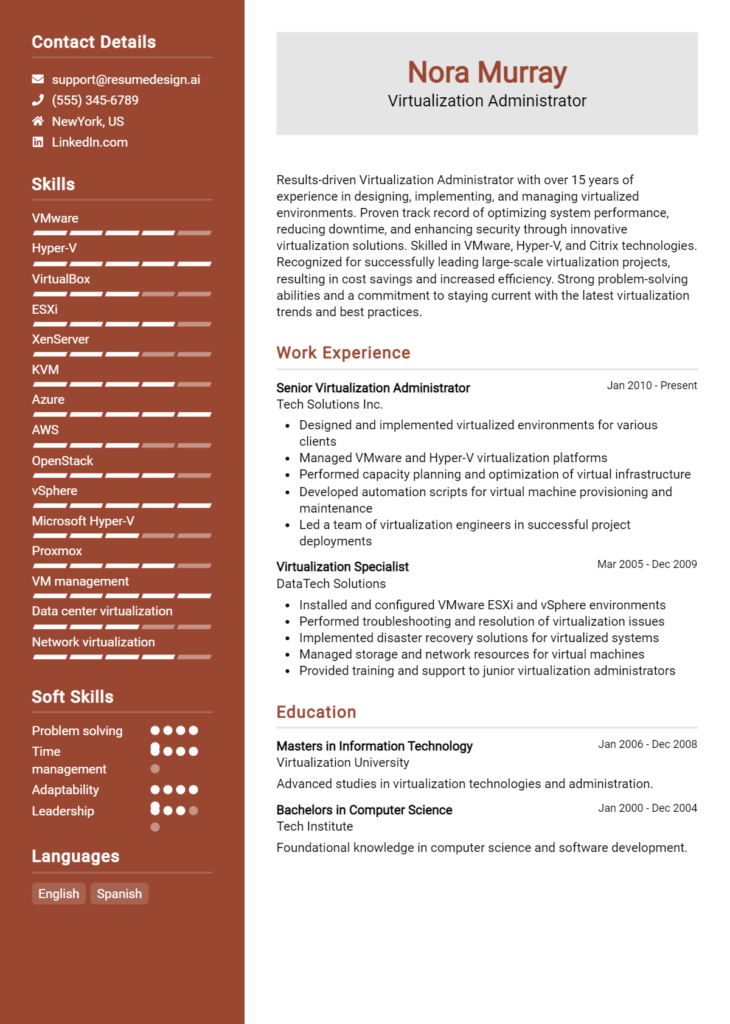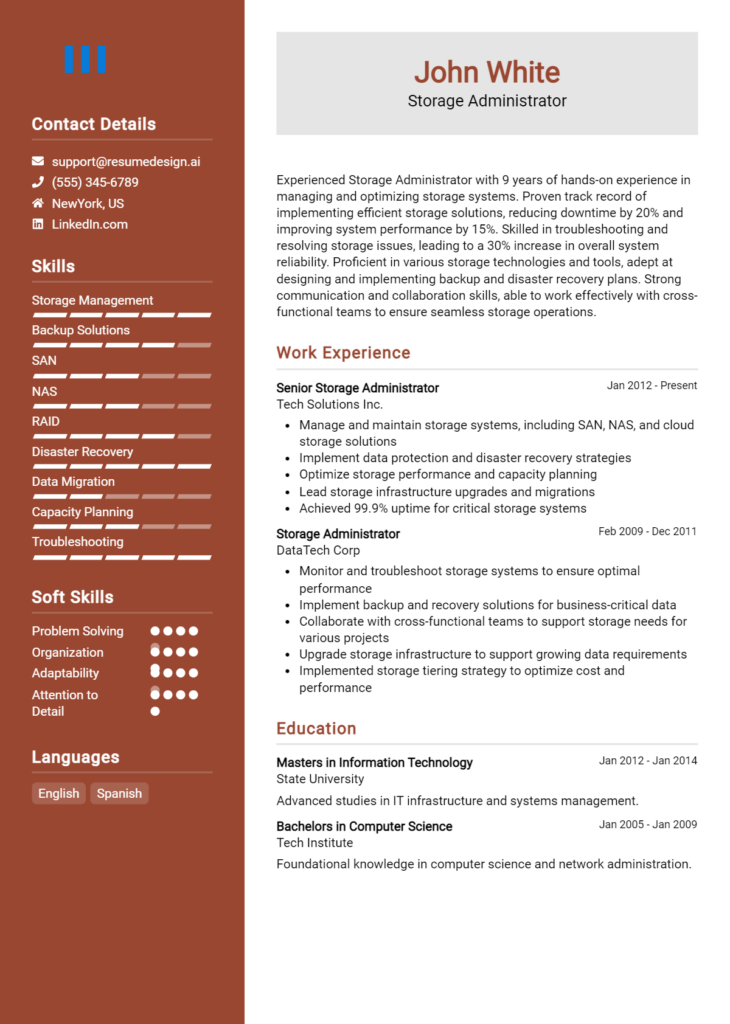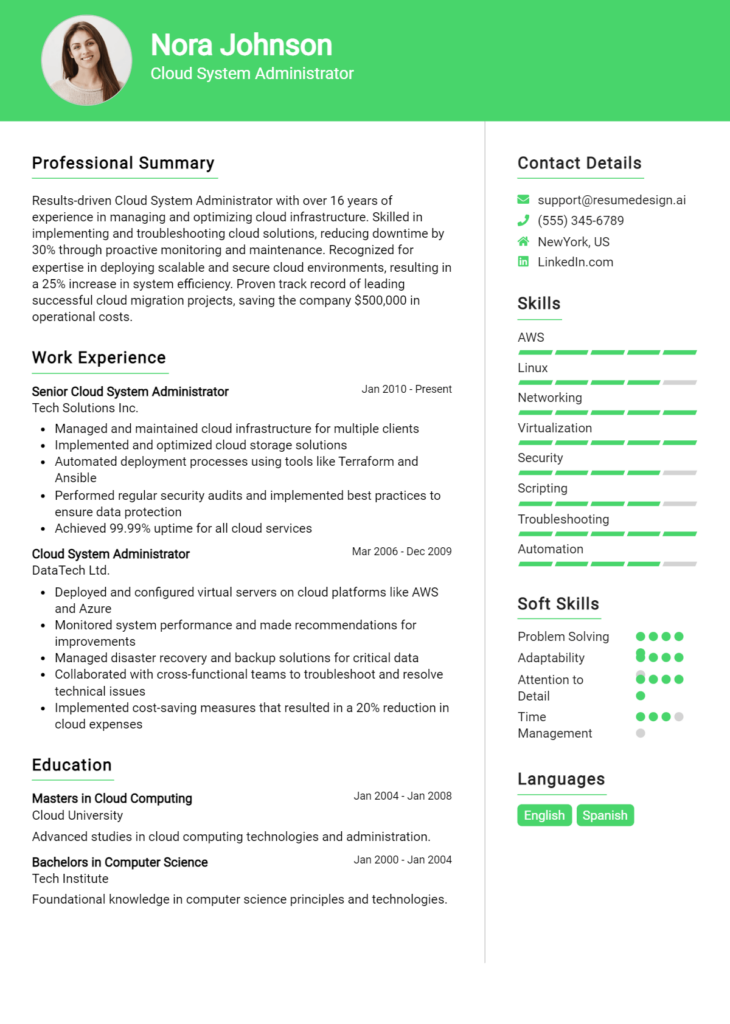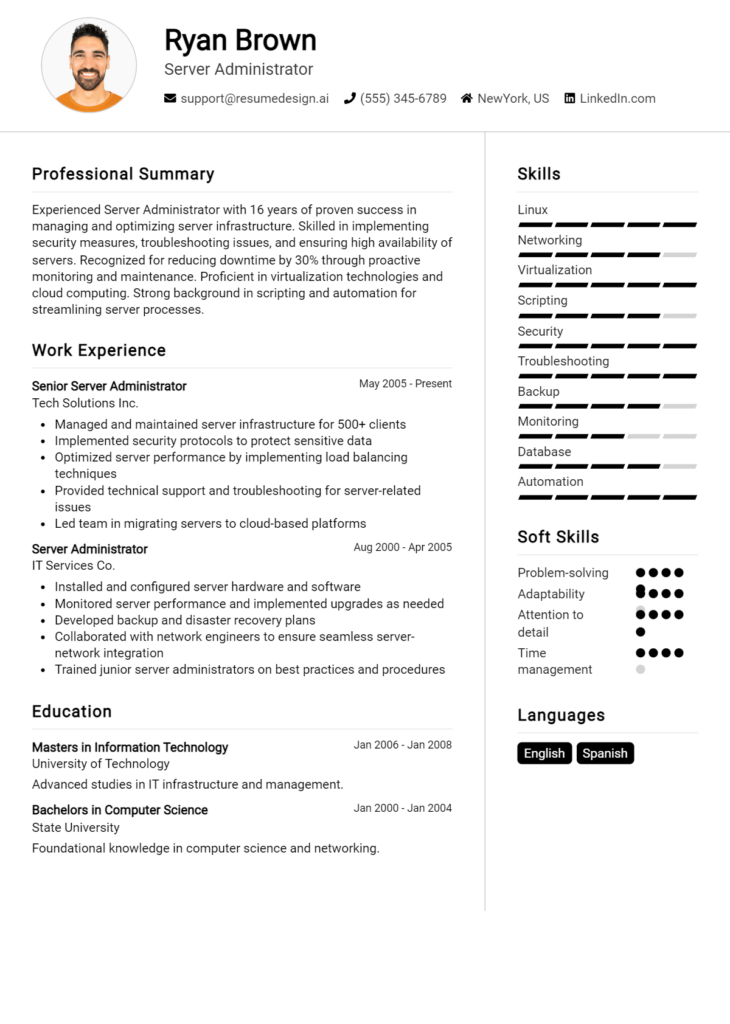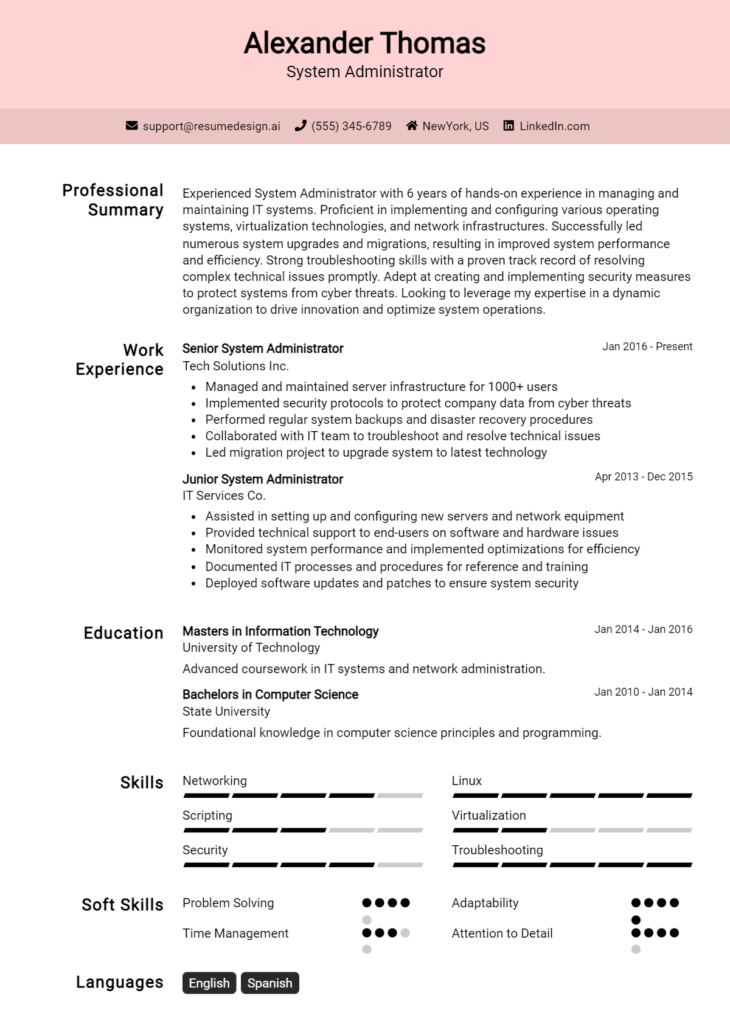AWS Systems Administrator Core Responsibilities
An AWS Systems Administrator plays a crucial role in managing cloud infrastructure, ensuring smooth operations across various departments. Their core responsibilities include deploying and maintaining AWS services, automating processes, and troubleshooting issues to enhance efficiency. Essential skills encompass technical proficiency in cloud technologies, operational expertise, and strong problem-solving abilities. By effectively bridging IT and business functions, they contribute to organizational goals. A well-structured resume highlighting these qualifications can significantly elevate a candidate’s prospects in this competitive field.
Common Responsibilities Listed on AWS Systems Administrator Resume
- Manage and monitor AWS cloud environments for optimal performance.
- Implement security best practices for cloud infrastructure.
- Automate deployment processes using Infrastructure as Code (IaC) tools.
- Conduct regular system backups and disaster recovery planning.
- Collaborate with development teams to support application deployment.
- Troubleshoot and resolve cloud-related issues efficiently.
- Maintain documentation for system configurations and procedures.
- Monitor resource usage and optimize costs within AWS.
- Perform system upgrades and maintenance tasks as needed.
- Ensure compliance with industry regulations and standards.
- Provide technical support and training to team members.
High-Level Resume Tips for AWS Systems Administrator Professionals
In today's competitive job market, a well-crafted resume is crucial for AWS Systems Administrator professionals seeking to make a memorable first impression on potential employers. Your resume often serves as the initial touchpoint between you and your future workplace, making it essential to showcase not only your technical skills and certifications but also your relevant achievements in the field. A resume that effectively highlights your expertise in AWS services, cloud architecture, and system management can set you apart from the competition. This guide will provide practical and actionable resume tips specifically tailored for AWS Systems Administrator professionals to help you create a standout document that captures the attention of hiring managers.
Top Resume Tips for AWS Systems Administrator Professionals
- Tailor your resume to the job description by incorporating relevant keywords and phrases to align with the specific requirements of the position.
- Showcase your relevant experience by including specific roles, responsibilities, and projects that highlight your proficiency with AWS services.
- Quantify your achievements with numbers, such as the percentage of cost savings achieved through efficient cloud management or the reduction in downtime due to your interventions.
- Highlight your technical skills by creating a dedicated skills section that lists key AWS tools, programming languages, and other technologies you are proficient in.
- Include certifications relevant to AWS, such as AWS Certified Solutions Architect or AWS Certified SysOps Administrator, to demonstrate your commitment to professional development.
- Use action verbs to describe your experiences, such as "implemented," "configured," "managed," and "optimized," to convey a sense of proactivity and impact.
- Maintain a clean and organized layout with clear headings and bullet points, making it easy for hiring managers to scan your resume quickly.
- Incorporate soft skills that are valuable in the AWS environment, such as problem-solving, teamwork, and communication, to complement your technical expertise.
- Keep your resume concise, ideally one page, focusing on the most relevant information that demonstrates your qualifications for the AWS Systems Administrator role.
By implementing these tips, you can significantly enhance your chances of landing a job in the AWS Systems Administrator field. A focused and well-structured resume that clearly communicates your skills, accomplishments, and industry knowledge will not only attract the attention of hiring managers but also position you as a strong candidate in the competitive landscape of cloud computing. Take the time to refine your resume, and you'll be one step closer to achieving your career goals in the AWS ecosystem.
Why Resume Headlines & Titles are Important for AWS Systems Administrator
In the competitive field of AWS Systems Administration, a well-crafted resume headline or title plays a crucial role in capturing the attention of hiring managers. A strong headline serves as a summary of a candidate's key qualifications, skills, and experience, delivering impactful information at a glance. It should be concise, relevant, and tailored to the specific job being applied for, ensuring that it resonates with the employer's needs. By effectively summarizing a candidate's strengths, a compelling headline can differentiate them from other applicants, making the first impression count.
Best Practices for Crafting Resume Headlines for AWS Systems Administrator
- Keep it concise—aim for one impactful sentence.
- Focus on role-specific keywords relevant to AWS Systems Administration.
- Highlight key skills or certifications, such as AWS Certified Solutions Architect.
- Incorporate measurable achievements or years of experience.
- Use action-oriented language to convey proactivity.
- Tailor the headline to match the job description and requirements.
- Avoid jargon that may not resonate with all hiring managers.
- Ensure it reflects your unique value proposition as a candidate.
Example Resume Headlines for AWS Systems Administrator
Strong Resume Headlines
AWS Certified Systems Administrator with 5+ Years of Experience in Cloud Infrastructure Management
Proficient AWS Systems Administrator Specializing in Automated Deployment and Security Best Practices
Results-Driven AWS Specialist with a Track Record of Reducing Downtime by 30%
Weak Resume Headlines
AWS Expert Looking for Opportunities
Systems Administrator with AWS Skills
Strong resume headlines are effective because they quickly convey the candidate's relevant experience and unique qualifications, making it easy for hiring managers to recognize their potential value. They highlight specific skills and accomplishments that align with the job requirements, creating an immediate connection. In contrast, weak headlines tend to be vague or generic, failing to provide any specific details that would entice a hiring manager. This lack of clarity and focus ultimately diminishes the candidate's chances of standing out in a crowded job market.
Writing an Exceptional AWS Systems Administrator Resume Summary
A resume summary is a critical component for an AWS Systems Administrator, as it serves as the first impression that a hiring manager will have of a candidate. A well-crafted summary quickly captures attention by highlighting key skills, relevant experience, and notable accomplishments tailored to the specific job role. It should be concise and impactful, effectively summarizing the candidate's qualifications in a way that encourages the reader to explore the rest of the resume. By focusing on the most pertinent aspects of their background, candidates can demonstrate their value and establish their suitability for the position right from the start.
Best Practices for Writing an AWS Systems Administrator Resume Summary
- Quantify achievements whenever possible, using metrics to demonstrate impact.
- Focus on relevant skills that align with the job description, such as cloud management, security protocols, and automation.
- Tailor the summary to the specific job by incorporating keywords from the job listing.
- Keep it concise, ideally within 3-5 sentences, to maintain the reader's attention.
- Highlight certifications and technical proficiencies, such as AWS Certified Solutions Architect or DevOps methodologies.
- Use action-oriented language to convey a sense of initiative and accomplishment.
- Showcase relevant industry experience, particularly in cloud environments and system administration.
- Avoid jargon or overly technical language that may not be understood by all hiring managers.
Example AWS Systems Administrator Resume Summaries
Strong Resume Summaries
Results-driven AWS Systems Administrator with over 5 years of experience managing cloud infrastructure for high-traffic applications. Successfully implemented monitoring solutions that increased uptime by 30% and reduced incident response time by 50%.
Detail-oriented AWS Certified Solutions Architect skilled in deploying scalable applications and optimizing cost management. Spearheaded a migration project that reduced operational costs by $20,000 annually through efficient resource allocation.
Proficient in managing AWS services, including EC2, S3, and RDS, with a strong focus on security best practices. Developed automated backup solutions that improved data recovery time by 40% and ensured compliance with industry regulations.
Weak Resume Summaries
Experienced IT professional with knowledge of AWS systems and cloud technologies.
AWS Systems Administrator with a focus on various tasks related to cloud management and system support.
The strong resume summaries are effective because they incorporate quantifiable results, specific skills, and direct relevance to the AWS Systems Administrator role, making it clear how the candidate can contribute to an organization. In contrast, the weak summaries are vague, lacking in detail and measurable outcomes, which may fail to engage hiring managers or provide a compelling reason to consider the candidate further.
Work Experience Section for AWS Systems Administrator Resume
The work experience section of an AWS Systems Administrator resume is crucial as it serves as a platform to demonstrate the candidate's technical acumen, leadership abilities, and capacity to deliver high-quality solutions in a cloud environment. This section not only highlights the specific skills and technologies the candidate has mastered but also showcases their experience in managing teams and projects effectively. By quantifying achievements and aligning their experience with industry standards, candidates can present a compelling narrative of their professional journey, illustrating how their contributions have made a tangible impact on their previous organizations.
Best Practices for AWS Systems Administrator Work Experience
- Highlight specific AWS services and tools you have worked with, such as EC2, S3, RDS, or CloudFormation.
- Quantify your achievements with metrics, such as reducing downtime by X% or managing AWS costs effectively.
- Demonstrate your ability to collaborate with cross-functional teams and lead projects.
- Use action verbs to describe your responsibilities and accomplishments, such as "implemented," "optimized," or "automated."
- Align your experiences with industry standards and best practices to show relevance.
- Include any certifications or specialized training that enhances your qualifications.
- Focus on outcomes and results rather than just listing duties performed.
- Tailor your work experience to the specific AWS job you are applying for, emphasizing relevant skills.
Example Work Experiences for AWS Systems Administrator
Strong Experiences
- Led a team of 5 in migrating 20+ legacy applications to AWS, resulting in a 30% reduction in operational costs and improved system performance.
- Implemented an automated backup solution using AWS Lambda and S3, increasing data recovery speed by 50% and ensuring compliance with data retention policies.
- Optimized AWS infrastructure by conducting cost analysis, successfully reducing monthly expenses by $10,000 while maintaining performance and availability.
- Collaborated with development teams to deploy CI/CD pipelines using AWS CodePipeline, enhancing deployment frequency and reducing lead time by 40%.
Weak Experiences
- Worked with AWS services to support team projects.
- Assisted in maintaining cloud infrastructure and resolving issues as they arose.
- Participated in various team meetings and contributed to discussions about cloud solutions.
- Helped with some AWS-related tasks under the supervision of senior staff.
The examples provided above illustrate the distinction between strong and weak experiences. The strong experiences are framed with specific achievements, metrics, and clear demonstrations of leadership and collaboration, making them impactful. In contrast, the weak experiences lack detail, are vague, and fail to convey the candidate's contributions and skills effectively. By focusing on quantifiable outcomes and a clear narrative, candidates can significantly enhance their appeal to potential employers.
Education and Certifications Section for AWS Systems Administrator Resume
The education and certifications section of an AWS Systems Administrator resume is crucial as it showcases the candidate's academic background and industry-relevant qualifications. This section not only highlights formal education but also emphasizes the importance of certifications that validate the candidate's skills and knowledge in AWS technologies. By including relevant coursework, specialized training, and recognized certifications, candidates can significantly enhance their credibility, demonstrating a commitment to continuous learning and alignment with the specific requirements of the AWS Systems Administrator role.
Best Practices for AWS Systems Administrator Education and Certifications
- Prioritize certifications from recognized bodies, such as AWS Certified Solutions Architect or AWS Certified SysOps Administrator.
- Include relevant degrees, such as a Bachelor's in Computer Science, Information Technology, or a related field.
- Detail relevant coursework that aligns with AWS services and cloud computing concepts.
- Highlight any ongoing education or training initiatives to show a commitment to staying current in the field.
- Use clear formatting to distinguish between degrees, certifications, and specialized training.
- Be specific about the level of certification (e.g., Associate, Professional) to indicate expertise.
- Remove outdated certifications or those not relevant to AWS technologies to streamline the resume.
- Consider including any hands-on projects or labs completed as part of training to demonstrate practical experience.
Example Education and Certifications for AWS Systems Administrator
Strong Examples
- Bachelor of Science in Information Technology, University of XYZ, 2020
- AWS Certified Solutions Architect – Associate, 2023
- Completed coursework in Cloud Computing and Network Security, University of XYZ
- AWS Certified SysOps Administrator – Associate, 2022
Weak Examples
- Associate Degree in Culinary Arts, ABC Community College, 2019
- CompTIA A+ Certification, 2015
- Completed coursework in Graphic Design, University of ABC
- Microsoft Certified Professional (MCP), 2018
The examples provided are considered strong or weak based on their relevance to the AWS Systems Administrator role. Strong examples highlight degrees and certifications that directly pertain to cloud computing, AWS services, and relevant technical skills, showcasing the candidate's qualifications for the job. Conversely, weak examples feature degrees and certifications that do not align with the field of AWS systems administration, thus diminishing the candidate's credibility and relevance to prospective employers.
Top Skills & Keywords for AWS Systems Administrator Resume
As an AWS Systems Administrator, possessing a robust set of skills is crucial for effectively managing and optimizing cloud infrastructure. A well-crafted resume that highlights both hard and soft skills can significantly enhance your chances of landing an interview. Employers seek candidates who not only have technical expertise but also demonstrate strong interpersonal abilities. By showcasing your proficiency in AWS services, cloud security, and system monitoring, alongside your problem-solving and communication skills, you can present yourself as a well-rounded candidate ready to tackle the challenges of cloud management. For a deeper understanding of the essential skills needed in your resume, consider the following lists of key competencies.
Top Hard & Soft Skills for AWS Systems Administrator
Hard Skills
- AWS CloudFormation
- EC2 Management
- S3 Storage Solutions
- IAM Roles and Policies
- VPC Configuration
- CloudWatch Monitoring
- RDS Database Management
- Lambda Functions
- Security Groups Configuration
- Disaster Recovery Solutions
- Automation with Terraform
- Linux/Unix System Administration
- Networking Concepts (TCP/IP, DNS)
- Backup and Recovery Solutions
- Load Balancing Techniques
- DevOps Practices
- CI/CD Pipeline Management
Soft Skills
- Strong Problem-Solving Abilities
- Effective Communication Skills
- Team Collaboration
- Adaptability and Flexibility
- Time Management
- Attention to Detail
- Critical Thinking
- Customer Service Orientation
- Leadership Qualities
- Conflict Resolution
- Project Management Skills
- Ability to Work Under Pressure
- Creative Thinking
- Initiative and Proactivity
- Emotional Intelligence
- Mentoring and Coaching
- Negotiation Skills
- Analytical Mindset
By integrating these essential skills into your resume, you can effectively demonstrate your qualifications for the AWS Systems Administrator role. Additionally, highlighting relevant work experience can further solidify your candidacy and showcase your capacity to contribute to an organization's cloud strategy.
Stand Out with a Winning AWS Systems Administrator Cover Letter
Dear Hiring Manager,
I am writing to express my interest in the AWS Systems Administrator position at [Company Name], as advertised on [Job Board/Company Website]. With a strong background in cloud computing and extensive experience in managing AWS environments, I am confident in my ability to contribute effectively to your team. My hands-on experience with AWS services, combined with my commitment to optimizing system performance and enhancing security, makes me a perfect fit for this role.
In my previous role at [Previous Company Name], I successfully managed a multi-account AWS environment, implementing best practices for security, cost management, and resource allocation. I have a proven track record of deploying and managing AWS CloudFormation templates, EC2 instances, S3 buckets, and RDS databases. Additionally, I have automated several operational tasks using AWS Lambda and CloudWatch, resulting in a significant reduction in response time and increased efficiency. My proactive approach to monitoring systems and troubleshooting issues has consistently enhanced system uptime and user satisfaction.
I am particularly drawn to [Company Name] because of its commitment to innovation and excellence in the cloud space. I am eager to bring my skills in infrastructure as code, serverless architecture, and continuous integration/continuous deployment (CI/CD) practices to your esteemed organization. Furthermore, I am passionate about staying updated with the latest AWS features and certifications, which I believe will enable me to provide valuable insights and solutions that align with your business objectives.
Thank you for considering my application. I am looking forward to the opportunity to discuss how my expertise in AWS systems administration can benefit [Company Name] and contribute to its ongoing success. Please feel free to contact me at [Your Phone Number] or [Your Email Address] to schedule a conversation.
Sincerely,
[Your Name]
Your LinkedIn Profile
Your Address
Common Mistakes to Avoid in a AWS Systems Administrator Resume
When crafting a resume for an AWS Systems Administrator position, it's crucial to present your skills and experience effectively. Many candidates make common mistakes that can detract from their qualifications and hinder their chances of landing an interview. Avoiding these pitfalls can significantly enhance the impact of your resume and showcase your expertise in managing AWS environments.
Vague Job Descriptions: Failing to provide specific details about your roles and responsibilities can leave hiring managers uncertain about your actual experience. Use clear and concise language to describe your contributions and achievements.
Lack of Relevant Keywords: Not including industry-specific keywords related to AWS, such as "EC2," "S3," "IAM," or "CloudFormation," can result in your resume being overlooked by automated applicant tracking systems (ATS) that filter applications.
Ignoring Certifications: AWS offers several certifications that validate your skills. Omitting these from your resume can make you less competitive. Always highlight relevant certifications prominently.
Overloading with Technical Jargon: While technical skills are essential, using too much jargon without context can alienate non-technical hiring managers. Balance technical language with clear explanations of your work.
Neglecting Soft Skills: AWS Systems Administrators need strong communication and problem-solving skills. Focusing solely on technical abilities can give a skewed impression of your overall capabilities. Include examples of how you’ve successfully collaborated with teams or resolved conflicts.
Formatting Issues: A cluttered or poorly formatted resume can distract from your qualifications. Ensure that your resume is easy to read, with consistent formatting, bullet points, and appropriate spacing.
Failure to Quantify Achievements: Providing quantifiable results helps illustrate the impact of your work. Use metrics to demonstrate how you improved system performance, reduced costs, or enhanced security.
Not Tailoring the Resume for Each Application: Sending out the same generic resume for every job application is a missed opportunity. Customize your resume to align with the specific requirements and responsibilities outlined in each job description.
Conclusion
As an AWS Systems Administrator, your role is crucial in managing and optimizing cloud infrastructure, ensuring security, and maintaining system performance. Throughout this article, we have discussed the essential skills required for this position, including proficiency in AWS services, experience with cloud architecture, strong troubleshooting capabilities, and knowledge of security best practices. Additionally, we highlighted the importance of continuous learning and certification to stay current in this rapidly evolving field.
To excel in your career as an AWS Systems Administrator, it is vital to have a standout resume that effectively showcases your skills and experience. A well-crafted resume can make a significant difference in attracting the right job opportunities. We encourage you to take the time to review your AWS Systems Administrator resume and ensure it reflects your qualifications accurately.
To assist you in this process, consider utilizing resources such as resume templates, which can provide you with a professional layout. Additionally, a resume builder can help you create a customized resume that highlights your unique skills and experiences. You can also explore resume examples for inspiration and to understand how others in your field are presenting their qualifications. Lastly, don’t forget the importance of a compelling cover letter, for which you can find various cover letter templates to guide you.
Take action today to refine your resume and enhance your job prospects in the dynamic field of AWS Systems Administration!

